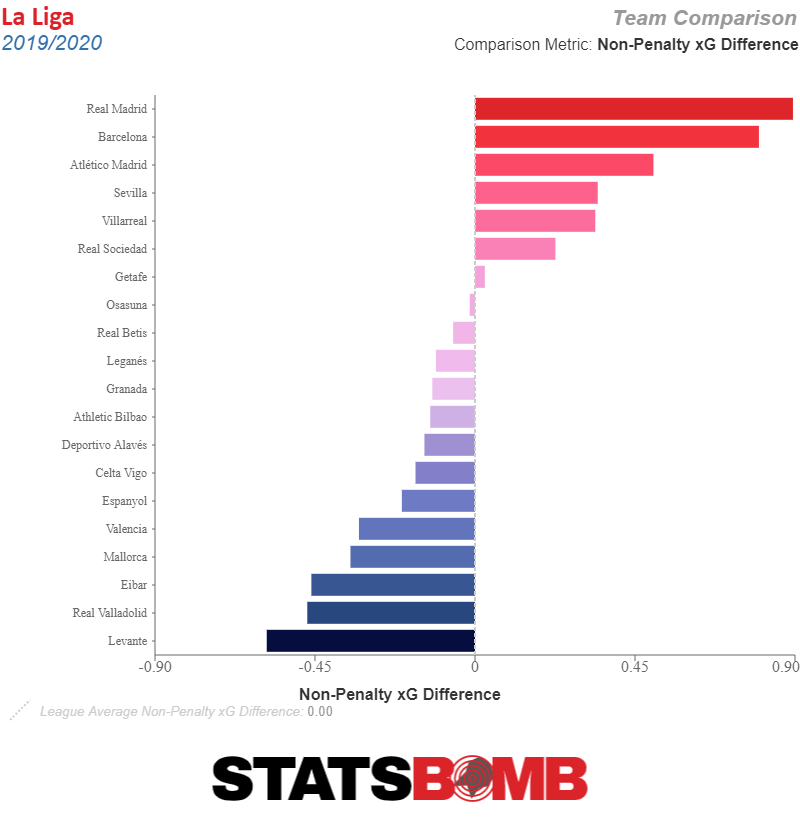The second international break of the season is always a time when clubs who have made bad starts seriously consider the continuation of their head coaches. In La Liga, Espanyol were the first to act, firing David Gallego after taking just five points from their first eight fixtures -- the joint-worst start to a campaign in the club’s history. Last season, Espanyol secured European football for the first time in over a decade by converting the league’s eighth-best expected goal (xG) difference into a seventh-place finish. Hopes were high ahead of the new campaign, even following the departure of coach Rubi and top scorer Borja Iglesias to Real Betis, and defender Mario Hermoso to Atlético Madrid. The assumption was that their early start to the season in the Europa League qualifiers would help them fly out of the blocks in La Liga. That hasn’t proved to be the case at all. Espanyol sit second bottom with the league’s worst goal difference. No team has scored less than them, and only one has conceded more. They’ve led just twice all season, for a grand total of 58 minutes. They’ve lost all four of their home matches, scoring once while conceding 10. Supporters were already calling for Gallego’s head prior to Sunday’s 2-0 defeat away to Mallorca. In truth, those are the sort of results that would have any coach under pressure, although the underlying numbers suggest all isn’t quite as bad as it seems on the surface. Espanyol have been worse in attack than they were last season, taking less shots of lower average quality, but they’ve also given less away defensively. The balance is an xG difference of 0.10 per match -- marginally better than their season-long rate of the previous campaign. 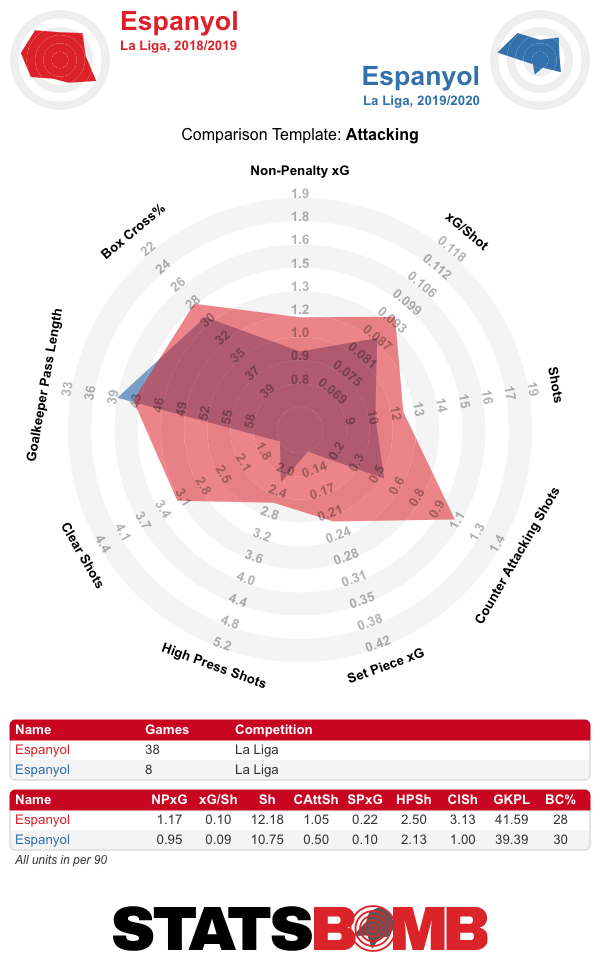
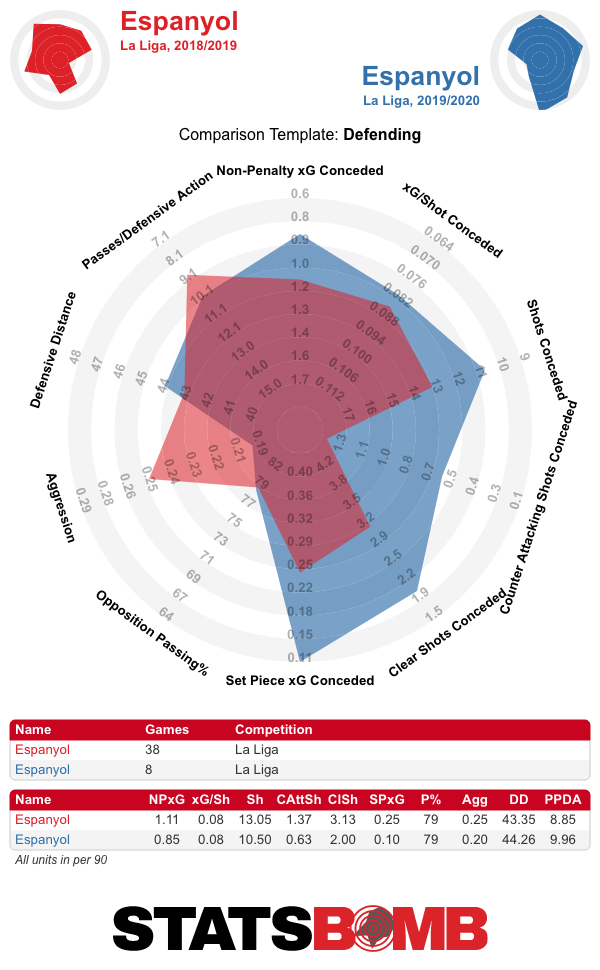 The main problem is that they are underperforming those numbers at both ends of the pitch. They’ve scored 3.8 less goals than expected and conceded 5.74 more -- a near 10-goal negative swing in comparison to their xG difference. In attack, they’ve converted three of the four highest-quality chances they’ve created, while getting nothing out of their remaining 83 shots (their other goal this season was an own goal):
The main problem is that they are underperforming those numbers at both ends of the pitch. They’ve scored 3.8 less goals than expected and conceded 5.74 more -- a near 10-goal negative swing in comparison to their xG difference. In attack, they’ve converted three of the four highest-quality chances they’ve created, while getting nothing out of their remaining 83 shots (their other goal this season was an own goal): 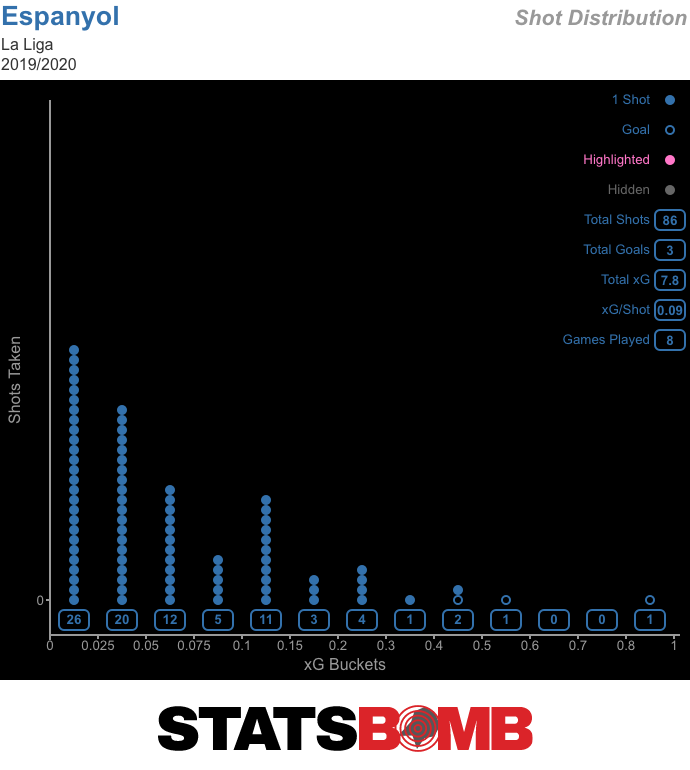 At the other end, opponents have likewise converted five of the six highest-quality chances Espanyol have conceded, but they have also scored seven times off shots in the five lowest-quality brackets -- all less than one-in-six opportunities:
At the other end, opponents have likewise converted five of the six highest-quality chances Espanyol have conceded, but they have also scored seven times off shots in the five lowest-quality brackets -- all less than one-in-six opportunities: 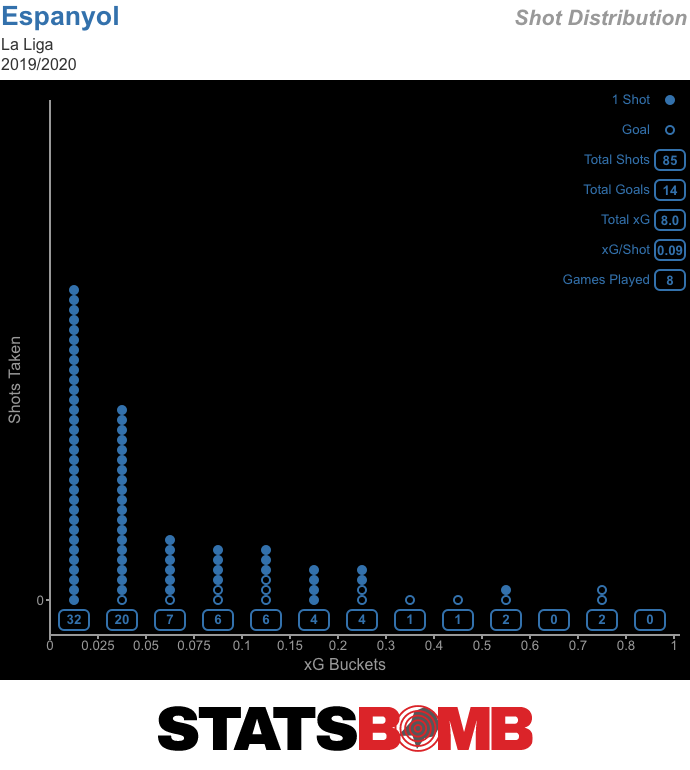 Those are the kinds of things that tend to even out over time. Having successfully led the team through the Europa League qualifying rounds into the group stage, Gallego may feel that he deserved some more of that. It bears noting that the lowest any team with a positive xG difference has finished in La Liga in either of the last two seasons is 12th. Perhaps reality would eventually have caught up with the underlying numbers. That would be the generous reading. We are only eight matches into the campaign and so difficulty of schedule is still a prominent factor in team performance. Espanyol’s has been very mild to date, pitting them against two of the three promoted teams, two teams who narrowly avoided relegation last season, an Alavés side who have looked one of the weakest in La Liga so far, and none of last season’s top five. It is questionable whether their positive underlying numbers would have held through the tougher fixtures now to come. In whatever terms you look at it, Espanyol have been dreadful in the first halves of their matches to date, being comfortably outshot, outscored and out-xG’d. They’ve only taken four shots on target, to 17 against, and just one from inside the area, to 12 against. Regardless of the degree to which you are later able to create chances (Espanyol’s second-half balance is 5.94 xG to 2.13 xG conceded), consistently putting yourself at that sort of disadvantage is a recipe for failure. And then there are the subjective impressions. Gallego’s Espanyol didn’t seem to have a clear idea of how to progress the ball upfield and were heavily reliant on individual inspiration to create opportunities in attack. Summer signing Matías Vargas, the most expensive in the club’s history, took on the large majority of the creative burden (he currently leads the team in dribbles, throughballs, xG assisted and open play passes into the box). The lack of systemised ball progression surely contributed to three giveaways in defensive territory that led directly to opposition goals. In that context, and with some interesting coaches with experience and previous success freely available to take over, it is fairly easy to make a case for Espanyol’s decision to replace Gallego.
Those are the kinds of things that tend to even out over time. Having successfully led the team through the Europa League qualifying rounds into the group stage, Gallego may feel that he deserved some more of that. It bears noting that the lowest any team with a positive xG difference has finished in La Liga in either of the last two seasons is 12th. Perhaps reality would eventually have caught up with the underlying numbers. That would be the generous reading. We are only eight matches into the campaign and so difficulty of schedule is still a prominent factor in team performance. Espanyol’s has been very mild to date, pitting them against two of the three promoted teams, two teams who narrowly avoided relegation last season, an Alavés side who have looked one of the weakest in La Liga so far, and none of last season’s top five. It is questionable whether their positive underlying numbers would have held through the tougher fixtures now to come. In whatever terms you look at it, Espanyol have been dreadful in the first halves of their matches to date, being comfortably outshot, outscored and out-xG’d. They’ve only taken four shots on target, to 17 against, and just one from inside the area, to 12 against. Regardless of the degree to which you are later able to create chances (Espanyol’s second-half balance is 5.94 xG to 2.13 xG conceded), consistently putting yourself at that sort of disadvantage is a recipe for failure. And then there are the subjective impressions. Gallego’s Espanyol didn’t seem to have a clear idea of how to progress the ball upfield and were heavily reliant on individual inspiration to create opportunities in attack. Summer signing Matías Vargas, the most expensive in the club’s history, took on the large majority of the creative burden (he currently leads the team in dribbles, throughballs, xG assisted and open play passes into the box). The lack of systemised ball progression surely contributed to three giveaways in defensive territory that led directly to opposition goals. In that context, and with some interesting coaches with experience and previous success freely available to take over, it is fairly easy to make a case for Espanyol’s decision to replace Gallego.
The Replacement: Pablo Machín
His successor is Pablo Machín, out of work since being sacked by Sevilla in March. It looks a good appointment. In his two top-flight seasons, Machín has shown himself to be a highly competent and somewhat adaptable coach. After securing Girona’s first-ever promotion to the Primera División, he led them to a 10th place finish in 2017-18 with a fairly industrial attack built around crosses and set-pieces, and a high-lined defence that did a very solid job of both breaking up opposing passing chains and suppressing shots. They finished the campaign with a positive shot ratio and the division’s 10th-best xG difference, at -0.03 per match. That campaign earned him the opportunity to move up to Sevilla. Machín made full use of the increased talent level, achieving a league third-best 0.52 xGD per match through his 27 matches at the helm. He instituted an open, run-and-gun approach that saw Sevilla outscore all but Barcelona and Real Madrid. His previous reliance on set-pieces and crosses eased considerably. Everything was going well until accumulated fatigue from an early start to the season in the Europa League qualifying rounds and a slump in form for goalkeeper Tomáš Vaclík (one that appears to have continued into the current campaign, as can be seen at the bottom of this piece) combined to produce a run of just two wins in 11 matches. Sevilla dropped out of the top four. Machín was sacked. 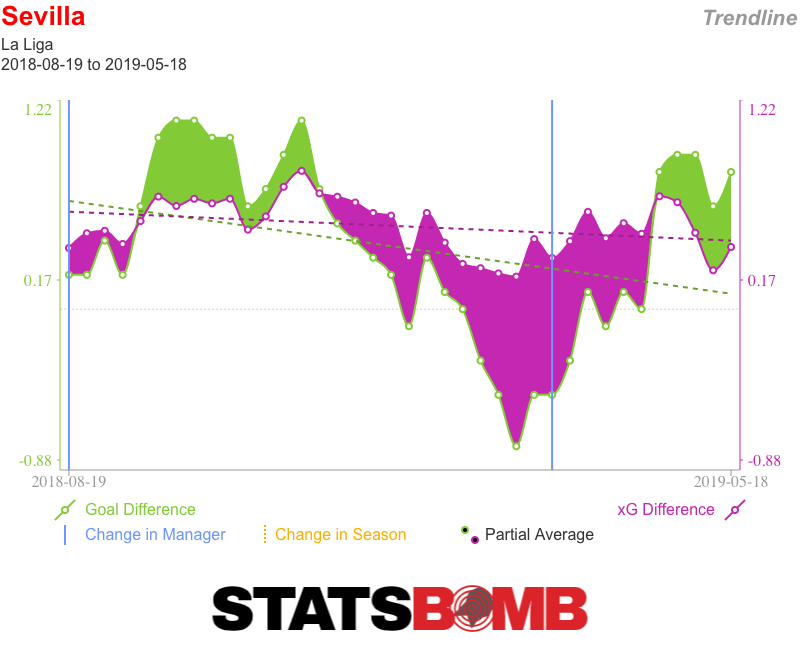 Espanyol provide him with the opportunity to prove that was a mistake. “It is a club that is improving, that wants to progress,” he said at his presentation. “And I am a coach with room still to improve. I’d like us to do it together.” Machín certainly inherits a squad that looks well-suited to his preferred setup, with different attacking configurations but always three central defenders and a pair of wing-backs. It will be particularly interesting to see what he is able to do with Adriá Pedrosa, a vibrant youngster somewhere between full-back and winger who should prosper at wing-back. His former Girona charge Bernardo Espinosa will be glad to see him after receiving no league action under Gallego. Marc Roca and Sergi Darder are very much capable of holding things together in midfield, while Óscar Melendo, one of the more promising young creative passers in La Liga, will hopefully get more chances than he latterly did under Gallego. There are a couple of question marks. Without Iglesias, Espanyol lack a proven goalscorer. Jonathan Calleri is physical, hard-working and good in the air (four of his nine goals at Alavés last season were from headers), but there has been little evidence to date to suggest he’ll be capable of Christian Stuani-like numbers at the head of a Machín attack. And will the squad be able to meet the physical demands of his approach over the full course of the campaign given that whether in terms of xG or results, both his Girona and Sevilla sides suffered a drop off in the second half of the season? But those are fairly minor concerns. There are worse teams than Espanyol in La Liga this season, and with a good coach now in charge, they should be expected to edge up towards the middle of the pack as the season progresses.
Espanyol provide him with the opportunity to prove that was a mistake. “It is a club that is improving, that wants to progress,” he said at his presentation. “And I am a coach with room still to improve. I’d like us to do it together.” Machín certainly inherits a squad that looks well-suited to his preferred setup, with different attacking configurations but always three central defenders and a pair of wing-backs. It will be particularly interesting to see what he is able to do with Adriá Pedrosa, a vibrant youngster somewhere between full-back and winger who should prosper at wing-back. His former Girona charge Bernardo Espinosa will be glad to see him after receiving no league action under Gallego. Marc Roca and Sergi Darder are very much capable of holding things together in midfield, while Óscar Melendo, one of the more promising young creative passers in La Liga, will hopefully get more chances than he latterly did under Gallego. There are a couple of question marks. Without Iglesias, Espanyol lack a proven goalscorer. Jonathan Calleri is physical, hard-working and good in the air (four of his nine goals at Alavés last season were from headers), but there has been little evidence to date to suggest he’ll be capable of Christian Stuani-like numbers at the head of a Machín attack. And will the squad be able to meet the physical demands of his approach over the full course of the campaign given that whether in terms of xG or results, both his Girona and Sevilla sides suffered a drop off in the second half of the season? But those are fairly minor concerns. There are worse teams than Espanyol in La Liga this season, and with a good coach now in charge, they should be expected to edge up towards the middle of the pack as the season progresses.
Stats of Interest
Luuk de Jong received plenty of stick after missing some good chances for Sevilla in their 4-0 defeat away to Barcelona on Sunday. He’s getting in the positions often enough this season, but sooner or later he needs to convert that into goals. 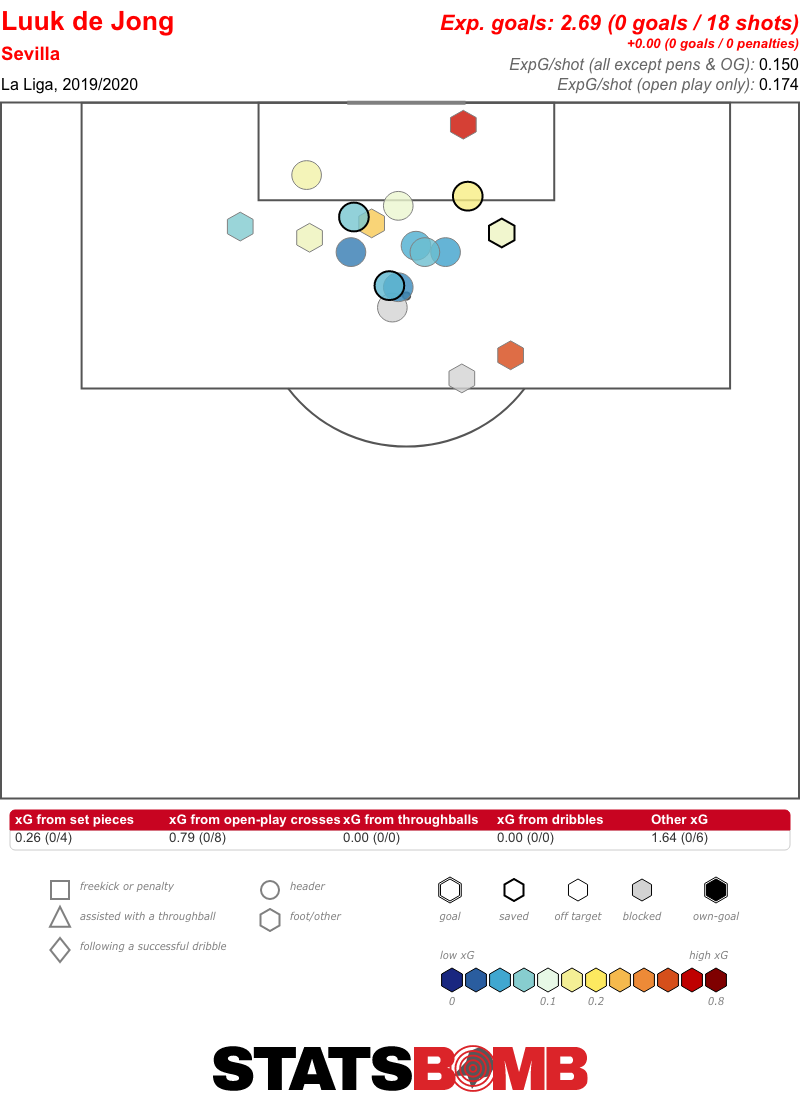 Sevilla also have problems in the other penalty area. Goalkeeper Vaclík has been pretty bad so far this season, conceding four more goals than expected -- the biggest underperformance of any goalkeeper in La Liga to date.
Sevilla also have problems in the other penalty area. Goalkeeper Vaclík has been pretty bad so far this season, conceding four more goals than expected -- the biggest underperformance of any goalkeeper in La Liga to date.  The only team currently below Espanyol in the table are a Leganés side on two points. Their underlying numbers have been solid enough to suggest they are capable of more, and the club’s confidence in coach Mauricio Pellegrino rightly persists. But they really have to start getting some points on the board.
The only team currently below Espanyol in the table are a Leganés side on two points. Their underlying numbers have been solid enough to suggest they are capable of more, and the club’s confidence in coach Mauricio Pellegrino rightly persists. But they really have to start getting some points on the board. 